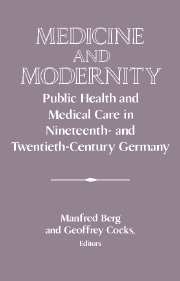Book contents
- Frontmatter
- Introduction
- 1 To Benefit the Poor and Advance Medical Science: Hospitals and Hospital Care in Germany, 1820-1870
- 2 From Traditional Individualism to Collective Professionalism: State, Patient, Compulsory Health Insurance, and the Panel Doctor Question in Germany, 1883—1931
- 3 In Search of German Social Darwinism: The History and Historiography of a Concept
- 4 Modern German Doctors: A Failure of Professionalization?
- 5 The Mentally Ill Patient Caught between the State's Demands and the Professional Interests of Psychiatrists
- 6 Rationalizing the Therapeutic Arsenal: German Neuropsychiatry in World War I
- 7 Sterilization and “Medical” Massacres in National Socialist Germany: Ethics, Politics, and the Law
- 8 The Old as New: The Nuremberg Doctors' Trial and Medicine in Modern Germany
- 9 The Debate that Will Not End: The Politics of Abortion in Germany from Weimar to National Socialism and the Postwar Period
- 10 The Sewering Scandal of 1993 and the German Medical Establishment
- Index
9 - The Debate that Will Not End: The Politics of Abortion in Germany from Weimar to National Socialism and the Postwar Period
Published online by Cambridge University Press: 05 January 2013
- Frontmatter
- Introduction
- 1 To Benefit the Poor and Advance Medical Science: Hospitals and Hospital Care in Germany, 1820-1870
- 2 From Traditional Individualism to Collective Professionalism: State, Patient, Compulsory Health Insurance, and the Panel Doctor Question in Germany, 1883—1931
- 3 In Search of German Social Darwinism: The History and Historiography of a Concept
- 4 Modern German Doctors: A Failure of Professionalization?
- 5 The Mentally Ill Patient Caught between the State's Demands and the Professional Interests of Psychiatrists
- 6 Rationalizing the Therapeutic Arsenal: German Neuropsychiatry in World War I
- 7 Sterilization and “Medical” Massacres in National Socialist Germany: Ethics, Politics, and the Law
- 8 The Old as New: The Nuremberg Doctors' Trial and Medicine in Modern Germany
- 9 The Debate that Will Not End: The Politics of Abortion in Germany from Weimar to National Socialism and the Postwar Period
- 10 The Sewering Scandal of 1993 and the German Medical Establishment
- Index
Summary
The current ongoing debates and dilemmas about abortion in united Germany, in both the “new” and the “old” states of the Federal Republic, are shadowed and shaped by a long history of conflict. It is a history marked - at least since the inclusion of Paragraphs 218-20 (which criminalized most abortions) in the penal code of the new German Reich in 1871 -by continuous controversy and attempts at regulation, albeit with many different permutations. The story is punctuated by sharp breaks in policy under different political regimes, but also - and perhaps above all - by a continually selective conditional approach, in which attitudes to abortion were mainly determined not in terms of rights but by assessments of social and economic conditions as well as of individual “fitness” and “health.” This chapter sets a context for discussion of the present unclear situation by following briefly some continuities and shifts from the Weimar campaigns for the abolition of Paragraph 218 through the Third Reich and then into the multiple changes of the postwar period. It also argues a point that should be self-evident but that seemingly needs to be continually revisited, especially in light of the wealth of newly open archival material now accumulating: The lines of continuity - of social control and social anxiety - that so preoccupy historians of modern Germany, especially those concerned with medicine and hygiene, look different if one follows the history of German abortion and birth control politics into the post-World War II period and beyond a narrative concluded by the descent into National Socialism and the Holocaust.
- Type
- Chapter
- Information
- Medicine and ModernityPublic Health and Medical Care in Nineteenth- and Twentieth-Century Germany, pp. 193 - 212Publisher: Cambridge University PressPrint publication year: 1997



